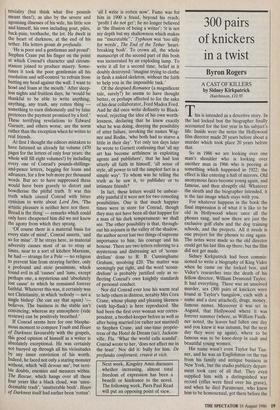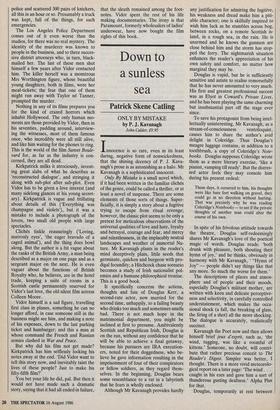300 pairs of knickers in a twist
Byron Rogers
A CAST OF KILLERS by Sidney Kirkpatrick Hutchinson, £10.95 This is intended as a detective story. In the last locked box the biographer finally accounted for the lost year in his subject's life. Inside were the notes the Hollywood film director made 20 years before about a murder which took place 20 years before that.
So in 1986 we are looking over one man's shoulder who is looking over another man in 1966 who is peering at something which happened in 1922; the effect is like entering a hall of mirrors. Old anonymous faces become young again, and famous, and then abruptly old. Whatever the sleuth and the biographer intended, it is the last image which stays with you.
For whatever happens in the book the final impression is of what it is like to be old in Hollywood where once all the phones rang, and now there are just the exclusive golf clubs and the dog training schools, and the projects. All it needs is one project for the phones to ring again. The notes were made so the old director could get his last film up there, but the film did not get made.
Sidney Kirkpatrick had been commis- sioned to write a biography of King Vidor when he came on the locked box, and Vidor's researches into the death of his fellow director, William Desmond Taylor. It had everything. There was an unsolved murder, sex (300 pairs of knickers were found in Taylor's bungalow, each with a name and a date attached), drugs, money, famous names. Moreover it was set in Asgard, that Hollywood where it was forever summer (where, as William Faulk- ner noted, the leaves had fallen one day and you knew it was autumn, but the next day they were up again), where to be famous was to be knee-deep in cash and beautiful young women.
His name wasn't even Taylor but Tan- ner, and he was an Englishman on the run from his family and antique business in New York, but the studio publicity depart- ment took care of all that. They even supplied him with a distinguished war record (rifles were fired over his grave), and when he died Paramount, who knew him to be homosexual, got there before the police and scattered 300 pairs of knickers, all this in an hour or so. Presumably a truck was kept, full of the things, for such emergencies.
The Los Angeles Police Department comes out of it even worse than the studios, for there was no real mystery. The identity of the murderer was known to people in the business, and to three succes- sive district attorneys who, in turn, black- mailed her. The last of these men shot himself a few years after Vidor contacted him. The killer herself was a monstrous Mrs Worthington figure, whose beautiful young daughters, both in films, were her meal-tickets; the fear that one of them might run away with Taylor ne Tanner, prompted the murder.
Nothing in any of its films prepares you for the kind of crazed horrors which inhabit Hollywood. The only human mo- ments are those provided by Vidor, then in his seventies, padding around, interview- ing the witnesses, most of them famous once, who incredibly were all still alive, and like him waiting for the phones to ring. This is the world of the film Sunset Boule- vard for, as far as the industry is con- cerned, they are all dead.
Kirkpatrick milks it atrociously, invent- ing great slabs of what he describes as 'reconstructed dialogue', and stringing it along with sub-plot after sub-plot. Even Vidor has to be given a love interest (and many sidelong glances at his young secret- ary). Kirkpatrick is vague and titillating about details of this (Everything was champagne and violets'), but it was a mistake to include a photograph of the lovers, two small old people with large spectacles.
Clichés tinkle reassuringly ('Loving, matronly eyes', 'the eager bravado of a caged animal'), and the thing does bowl along. But the author is a bit vague about the ranks of the British Army, a man being described as a major on one page and as a sergeant major on the next. He is even vaguer about the functions of British Royalty who, he believes, are in the hotel trade, keeping a suite of rooms in a Scottish castle permanently reserved for Vidor's last love, the old silent film actress Colleen Moore.
Vidor himself is a sad figure, travelling first class in planes, something he can no longer afford, in case someone still in the business might see him, and making a note of his expenses, down to the last parking ticket and hamburger; and this a man at whose command the French and Russian armies clashed in War and Peace.
But why did his film not get made? Kirkpatrick has him selflessly locking his notes away at the end. Did Vidor want to tell this story now, and inevitably taint the lives of these people? Just to make his fifty-fifth film?'
You bet your life he did, pal. But then it would not have made such a dramatic story, saying that it had all ended in failure, that the sleuth remained among the foot- notes. Vidor spent the rest of his life making documentaries. The irony is that Paramount, formerly wholesalers of ladies' underwear, have now bought the film rights of this book.











































 Previous page
Previous page